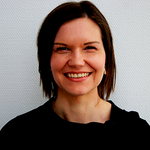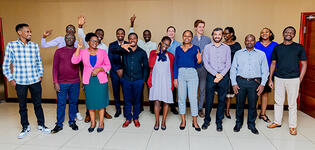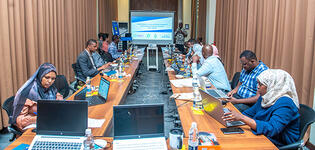Blog
Behind the scenes
Meet our tax-benefit microsimulation team in Viet Nam!
How can Vietnamese policymakers improve their policy choices related to social protection and tax policies? Who are the experts providing evidence on different policy scenarios and their pros and cons to local decision makers? Meet our SOUTHMOD national team working in Hanoi who are leading the development of VNMOD, the tax-benefit microsimulation model for Viet Nam.
Apart from model development, the long-standing collaboration between UNU-WIDER and Vietnamese partners has encompassed policy-related research efforts and seminars for model users. Since 2017, the team has delivered three training events for participants from academia and government, including for instance the General Statistics Office of Viet Nam (GSO) and the National Centre for Socio-economic Information and Forecast (NCIF).
The VNMOD team consists of three specialists working at the Central Institute for Economic Management (CIEM), the leading economic think tank in Viet Nam. The collaboration between UNU-WIDER and CIEM emerged from an earlier research project on structural transformation. With UNU-WIDER, CIEM is building its expertise in the impact of tax and benefit policy on households, as spearheaded by UNU-WIDER's SOUTHMOD project.
VNMOD, a tax-benefit microsimulation model for Viet Nam, was completed in April 2016. All team members — Duong, Minh, and Anh — have worked on the model ever since. Who are they, and why do they find their job inspiring and meaningful?
Nguyen Anh Duong
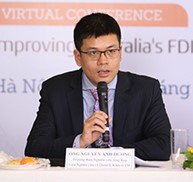 Duong is the Director of the Department for General Economic Issues and Integration Studies at CIEM, and the VNMOD team leader. He pursued studies in economics at the Australian National University and has worked at CIEM since 2004. As part of his work at CIEM, Duong is responsible for the policy research and policy recommendations provided to the Government of Viet Nam on topics related to economic growth and income analysis.
Duong is the Director of the Department for General Economic Issues and Integration Studies at CIEM, and the VNMOD team leader. He pursued studies in economics at the Australian National University and has worked at CIEM since 2004. As part of his work at CIEM, Duong is responsible for the policy research and policy recommendations provided to the Government of Viet Nam on topics related to economic growth and income analysis.
'Viet Nam is a transition economy and still has to work a lot on improving its tax and transfer policies. VNMOD has been and will continue to be instrumental in providing microsimulation-based evidence to support the formulation and revision of those policies,' says Duong.
'During the recent years, VNMOD has helped to provide simulation results for various scenarios of revising income tax rates. The model has also helped document the economic impact of adverse shocks (such as COVID-19) and related mitigation measures.
'We do face challenges as well. In striving to improve the quality and reliability of VNMOD, we need to validate the simulation results using official statistics. Still, we face a repeated challenge of finding sufficiently-detailed external statistics, especially related to social insurance.’
Tran Binh Minh
 As the Deputy Director of her department at CIEM, Minh collaborates closely with Duong. She has spent more than 15 years at CIEM and has been involved in many research studies related to macroeconomic policies, economic integration, and development. Her educational background is in the field of development economics, with studies at universities in Viet Nam, Netherlands, and Japan.
As the Deputy Director of her department at CIEM, Minh collaborates closely with Duong. She has spent more than 15 years at CIEM and has been involved in many research studies related to macroeconomic policies, economic integration, and development. Her educational background is in the field of development economics, with studies at universities in Viet Nam, Netherlands, and Japan.
'I am lucky to have been part of the VNMOD team from the start, ever since the first SOUTHMOD training in Johannesburg in 2015. By 2022, the work has involved several rounds of developing and upgrading VNMOD,' says Minh.
'Microsimulation results on the distributional impacts of policy reforms can be considered to be more convincing for making arguments and proposing policy changes than other research tools and types of analyses. There is still considerable need for capacity development in understanding and using various economic models, including a combination of micro-macro modelling, in supporting policy analysis and forecast. At CIEM we work hard to support such work. Of course, as taxes and transfers are cross-cutting topics in policymaking, related decisions demand involvement of various stakeholders at different ministries, the research community, and also international organizations and NGOs.
'One of the notable examples of the advantages of VNMOD training events was revealed by a participant from the General Statistics Office who took the course in 2018. They noticed that it would be fruitful to combine microsimulation results with their in-house statistics, so as to improve the quality and availability of more detailed data. The proposal was then taken up to collect information on households’ receipts of specific social transfers.
'The biggest challenge related to VNMOD, in my opinion, is finding resources to improve the consistency of micro-data at the household level in tailoring the analysis to specific taxes and transfer policies.'
Le Mai Anh
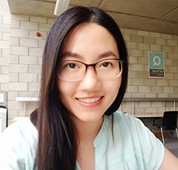 Anh is a researcher in the VNMOD team, and has worked at CIEM since 2013. She graduated from the Waterford Institute of Technology in Ireland, with a MBA in finance. Anh is happy to be a part of the VNMOD team, as tax and benefit research is her favourite topic, both in academic and professional life.
Anh is a researcher in the VNMOD team, and has worked at CIEM since 2013. She graduated from the Waterford Institute of Technology in Ireland, with a MBA in finance. Anh is happy to be a part of the VNMOD team, as tax and benefit research is her favourite topic, both in academic and professional life.
'VNMOD is extremely important to Viet Nam since it allows policymakers to make more informed decisions,' informs Anh.
'Since 2018, we have used training seminars to spread the word on the use of the EUROMOD programme to a number of governmental officers in Viet Nam. As a result, we've established a solid network to disseminate model findings, allowing us to make more timely suggestions to policymakers. Each member of our network can develop their own model and analyses, which will contribute to a more comprehensive understanding of Viet Nam's tax and benefit system.
'The biggest challenge for VNMOD, in my opinion, is the model’s limitations to quantify certain eligibility criteria and specific regulations due to restrictions in the underlying data. VNMOD can, for example, only define multidimensional poverty criteria to a limited extent based on income. Other aspects, such as the availability of clean water and sanitization that also influence the poverty criteria, cannot be fully quantified, resulting in a partial misreading of the situation.'
The VNMOD team, together with their UNU-WIDER SOUTHMOD team colleague Jesse Lastunen and David McLennan of Southern African Social Policy Research Insights SASPRI, will stay busy in developing the model further. The next steps for the team are producing a new country report and finalizing the study on the impact of COVID-19 on poverty and inequality in Viet Nam. Keep an eye on this dynamic team!
The views expressed in this piece are those of the authors, and do not necessarily reflect the views of the Institute or the United Nations University, nor the programme/project donors.
 Join the network
Join the network